Yangon’s top travel attractions! Sule pagoda, Circular Railway, Kalaywa Buddhist monastery lunch, Le Planteur.
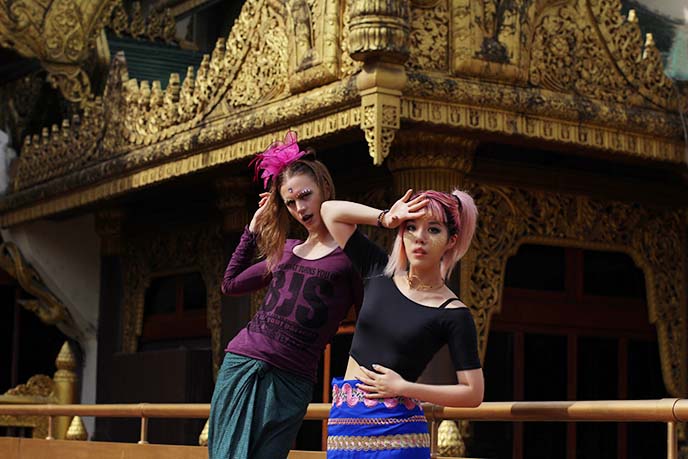
Ready for more decadent adventures with Yukiro?
I’ve been saving this final dispatch from Myanmar, since it was the most eye-opening destination we’ve visited together. We’ll give you a run-down of the best attractions in Yangon. The city has lots of fascinating sights, including the golden Karaweik Palace…
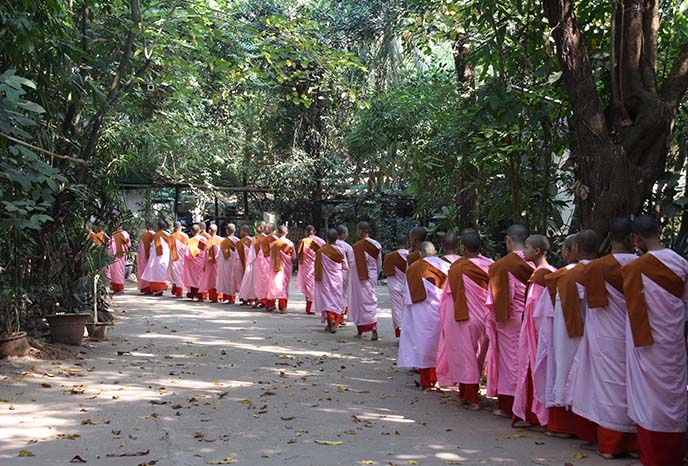
… and the lunch procession of Buddhist nuns and monks at Kalaywa Tawyakyaung Monastery.

We’ll also take you to Yangon Circular Rail. It goes all around the city in a loop, which lets you glimpse slices of life in Burma.

But first, the epic news… Yukiro and I are going to India and Malaysia!
This dream trip has been brewing for some time, and it’s finally happening. We’ll be visiting Kuala Lumpur, Langkawi and North India — including New Delhi, Agra (Taj Mahal), Jaipur and Varanasi (Indian Golden Triangle, and holy city where the Ganges river flows).
Can’t wait to reunite with this queen again. Be sure to follow @lacarmina Instagram and Snapchat to see snippets from our Indian epic. And if you have travel tips, we are all ears.

To get you in the mood, let’s flash back to Burma. Yukiro and I were endlessly inspired by the local culture we encountered.
We fully embraced the Southeast Asian elegant fashion and languorous poses. We drew inspiration from the “longyi” skirts and “thanaka” yellow sun-protection paste, worn by both local men and women. (All photos by Sniper Chau.)
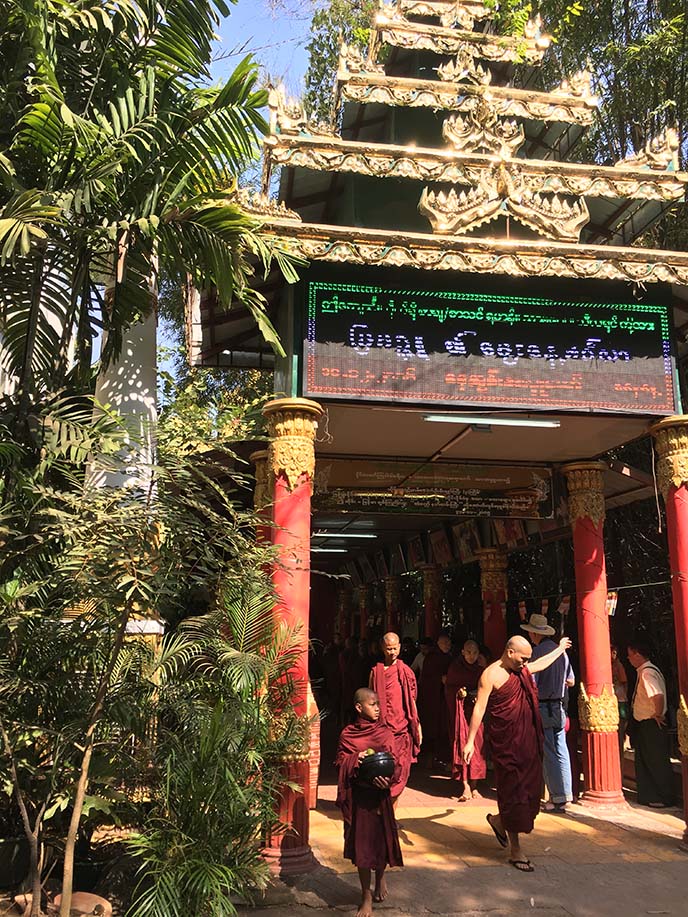
Many travelers know little about Burma / Myanmar (you may call it either, according to leader Aung San Suu Kyi) — other than that it’s the most Buddhist country on the planet. We wanted to learn more about the Theravada traditions, so our ParkRoyal hotel driver took us to Kalaywa Monastery, located about 20 minutes from downtown.
(Address: Naga Hlainggu Hillock, Yangon / Rangoon)

Aim to arrive around 10:30-11:30am, so that you can witness the Buddhist lunch procession. About a thousand monks and nuns line up, and walk through this food station run by volunteers. They gracefully receive hot food, vegetarian dishes and fresh fruit in their metal alms bowls.

For most of the Burmese population, Buddhism is an important part of their daily practice. These volunteers work together to prepare and serve the food, in the true spirit of loving-kindness.

In Burma, there are approximately 500,000 male monks, and 75,000 nuns. Lay-people often become “temporary” monks as well, such as by dedicating a month or so to living the monastic lifestyle.

Once they received their alms, the young practitioners walked over to the separate dining halls, where they sat and waited until everyone had been served.
They spend their lives in the kyaung (temple-monastery), where they devote every day to study and practice.

The Theravada Buddhist line of bhikkhuni (nuns) died out in Burma, so the women created a new type of lineage. These “thilashin” take vows, shave their heads and wear the pink robes — sometimes from a very young age.
(Many smiled gently at me, perhaps because of my matching pink hair and fashion!)

Over 1000 Buddhists live at Kalaywa Monastery. The community gladly supports their education and basic needs.

All over Myanmar, you’ll often see red-robed monks making their rounds for alms in the mornings. Even the poorest community members will prepare a dish of food, and dole out a serving into the bowl of each Buddhist that passes by.
Almsgiving is not a form of begging, but the local tradition that lets laypeople give respect to Buddhist monks and nuns, and support their spiritual journey.

When everyone was seated in the long benches, the monks clasped their hands together and chanted. Finally, it was time to break open the fruit and eat from the alms bowls, using their fingers.

We noticed a few cats walking around the tables! True to Buddhist spirit of compassion, these young men made sure the kitties had something to eat.

We encourage you to visit Kalaywa Monastery to learn more about the Burmese Buddhist tradition. If you walk around the grounds, you’ll see some beautiful flowers and gardens as well.

Visiting Karaweik Palace is another way to experience Burma’s culture. Located on Kandawgyi Lake in central Yangon, this golden floating restaurant is based on the design of the Pyigyimon royal barge.

Only customers are allowed inside, so we stopped for tea and pandan leaf-flavored ice cream. (It’s also possible to order Burmese food, and there is an international buffet as well).
We enjoyed cooling off in Karaweik Palace’s golden hall, and watching an energetic puppet show on the stage.

The restaurant hosts a Royal Culture Show every evening, with all types of Burmese performances. Yukiro could easily be mistaken for one of the dancers!
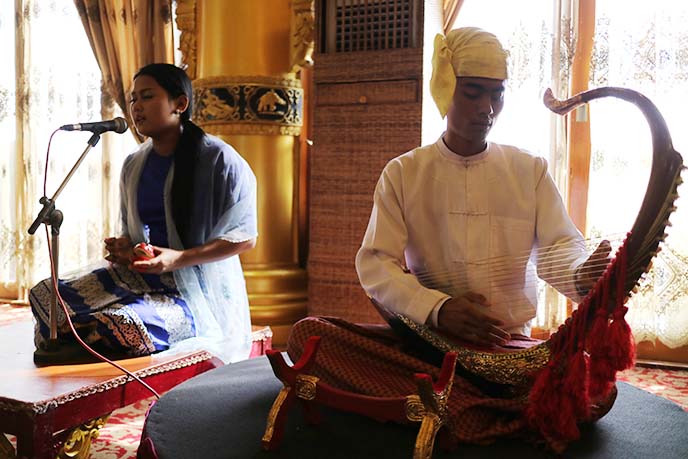
We listened to traditional songs performed by this singer and instrumentalist, who is strumming the Saung-gauk (Burmese arched harp).

Near the entrance of Karaweik restaurant, this stylish woman did a thanaka demonstration. She showed us how to grind bark to make the yellow-white cosmetic paste, which is worn to soften the skin and protect it from sun damage.
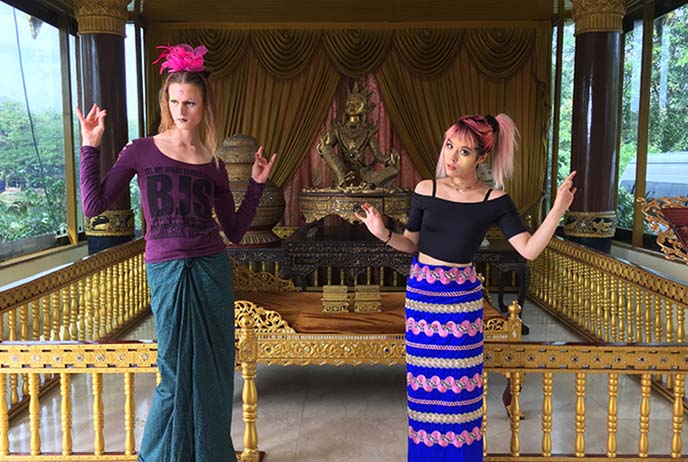
Karaweik Hall is a bit touristy, but it’s a fun spot to take photos and learn about Burmese culture.
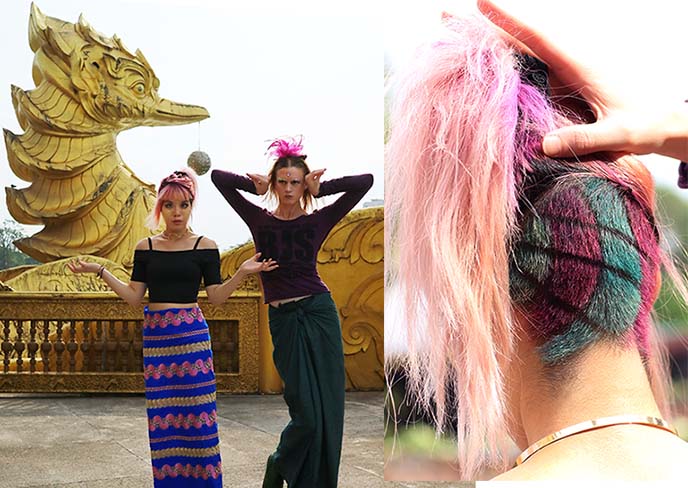
My ponytail reveals my cobweb undercut, or shaved and dyed hair tattoo! My hairstyle and color are by Stephanie Hoy at Sugar Skull Studio in Vancouver, as always.

As Seinfeld might say: What’s the deal with these “quacky” gold-headed ducks? Are they dragon boats, or rubber duckies?
In fact, they represent a mythical bird in Burmese folklore with a melodious cry, called the karaweik.
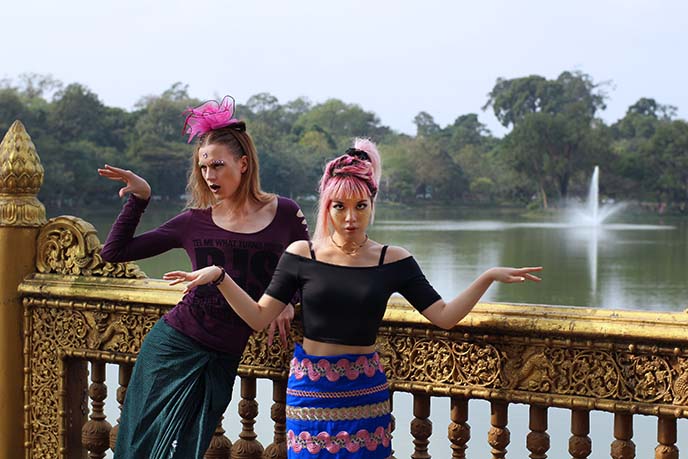
The golden barge gave us perfect views of Shwedagon Pagoda, Kandawgyi lake (with a tall fountain) and park.
I’m wearing an off-shoulder top by Black Milk Clothing, and a skirt from Park Royal hotel.
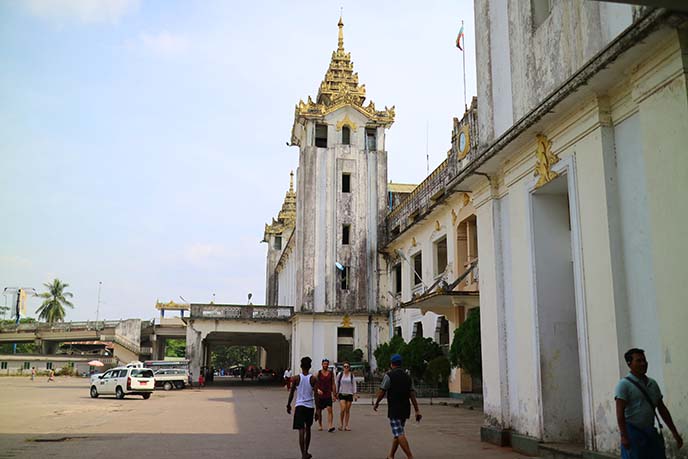
Another top attraction is — surprisingly enough — riding the rails. Yangon Circular Railway is similar to the Yamanote in Tokyo: a local commuter rail that forms a loop around the city.
Operated by Myanmar Railways, the line stretches 29 miles and has 39 stops. We went to Yangon Central Railway Station to check it out. (Address: Kun Chan Rd, Yangon, Myanmar)

Yangon’s Circle Rail is extremely popular among the locals. There are about 200 coaches, which carry 100,000 to 150,000 commuters daily.

Yukiro and I enjoy seeing daily life, wherever we travel. Yangon’s central station had a Complaint Center… but there was nobody there to complain to! (Now that’s something to complain about.)
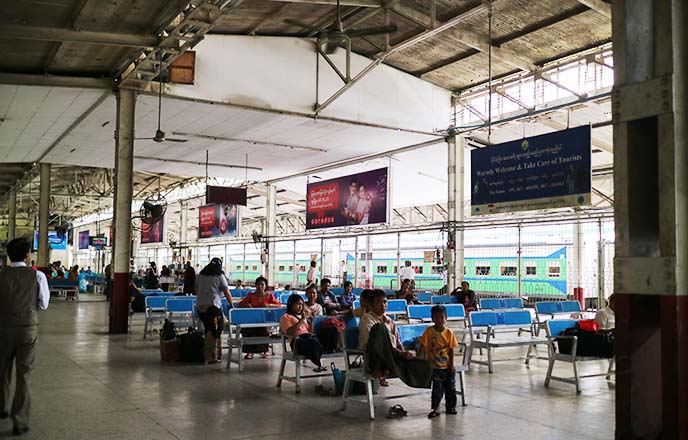
Many tourists ride the circular loop, which takes about three hours to complete. It’s a way to glimpse different parts of Yangon, and see what day-to-day life is like for the people who live here.
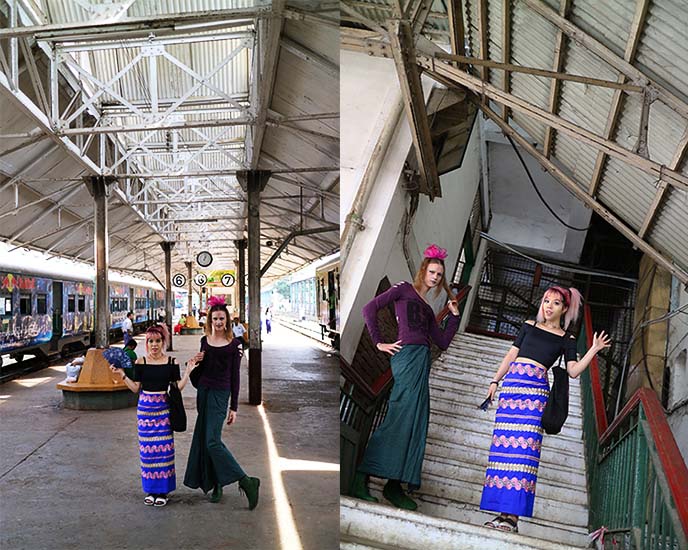
We decided the train journey would be a bit too hot and time-consuming… so we ended up simply visiting the Circular Train station.

As you can see, there’s no AC. The seats fill up quickly, so arrive early if you want to nab one.

Such cute and classic trains rolling through, with a choo-choo.
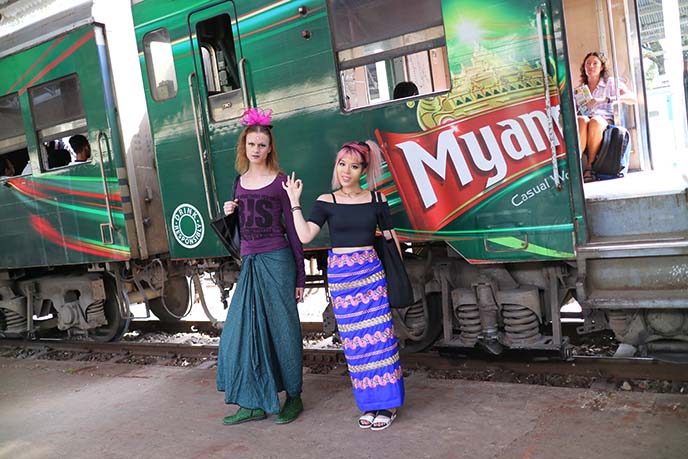
Yangon Circular Railway was first built during colonial times by the British. Today, the tracks have been modernized and expanded, and there are even ads on the front of the cars.

Each train ticket costs the equivalent of 15 cents! Ticket prices are kept low because of ministry subsidies, so this public transportation system is accessible to everyone.

Hello, boys of Burma…
(If you want to hop on this train with them, here’s info about getting tickets, timetables and more.)

Only in Myanmar, you’ll see people wearing thanaka (sometimes in intricate designs) on their faces.

The future of the railway is optimistic. Japan is currently working with Yangon city development to improve and expand public transport.
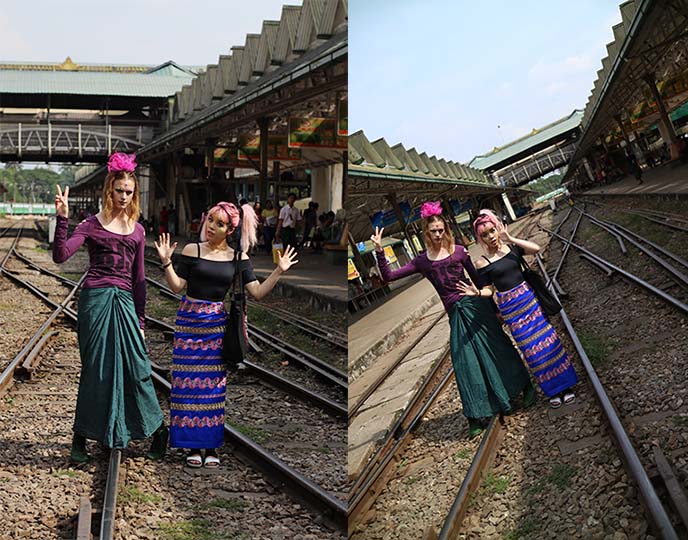
Yangon is a very safe city, and we rarely ran into touts or beggars. At the station, everyone we encountered was respectful.

Baby on board. (Images by Sniper Chau.)

Even if you don’t end up taking the three-hour ride, Yangon’s Circular Railway is worth checking out!
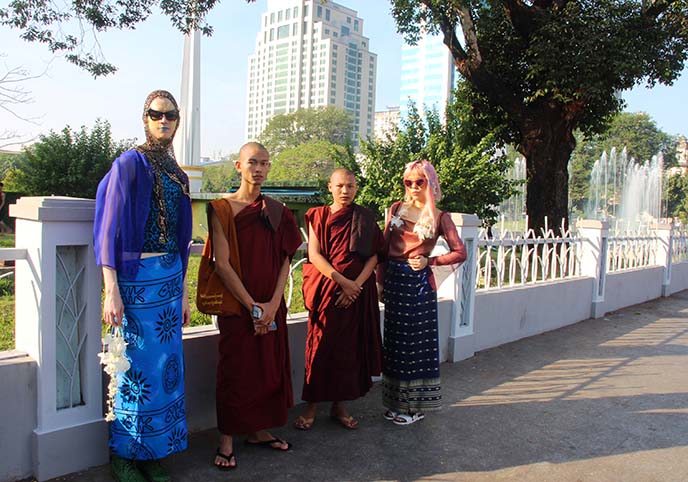
Another must-see is Maha Bandula Park, which features a fountain pond and sits next to Sule Pagoda. The park dates back to the late 19th century, and is currently named after General Maha Bandula who fought the British in the First Anglo-Burmese War.
During colonial times, the centerpiece of the park was a statue of Queen Victoria. After 1948, the queen was replaced by Independence Monument, an obelisk that commemorates Burmese independence from the British. (You can see it behind us.)
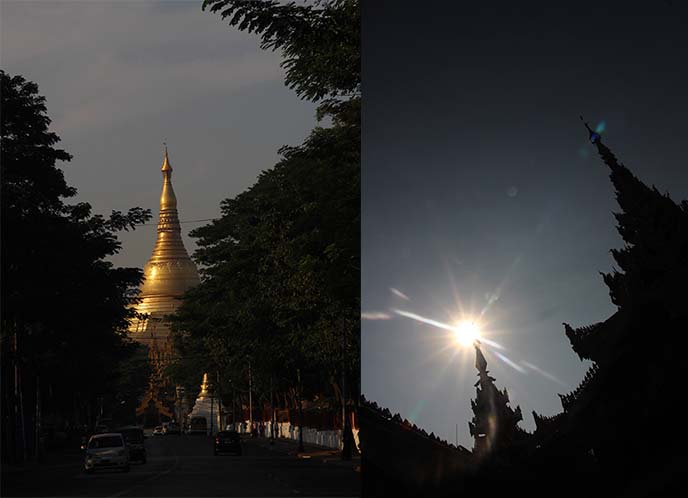
It’s impossible to miss Sule Pagoda, a glimmering golden dome in the center of Yangon’s downtown.
This spiritual site supposedly enshrines a hair of the Buddha. (It’s located at the junction of Sule Pagoda Road and Maha Bandula Road.)
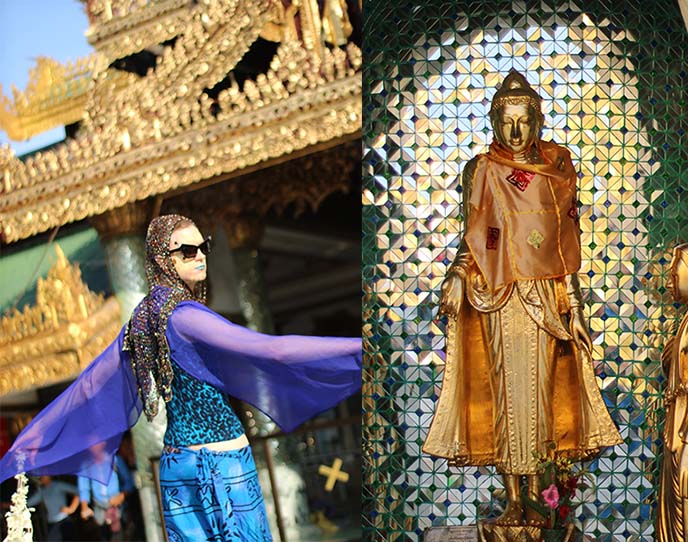
Sule Pagoda was the focal point of many political demonstrations over the years. Protesters gathered here during the 1988 uprisings and 2007 Saffron Revolution, both of which faced violent pushback from the military government that was then in power.
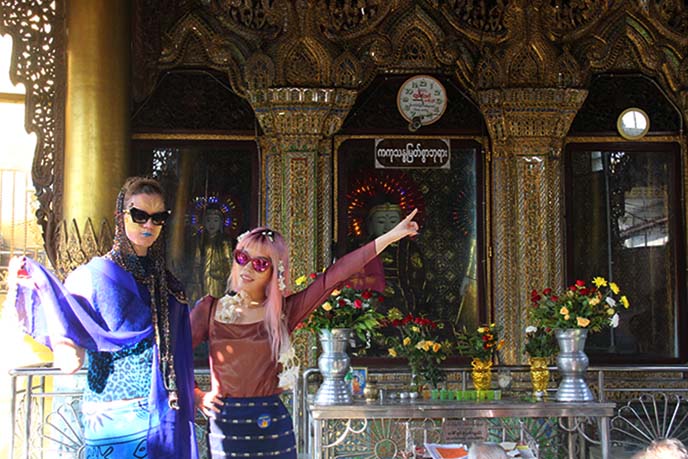
Today, it’s a peaceful Buddhist temple where city-dwellers can meditate.
Sule Pagoda is about the size of a small block — much smaller than Shwedagon Pagoda, which we visited too. You’ll see Buddha statues and golden architecture in both places, but if you only have time to visit one, go to the magnificent Shwe Dagon.
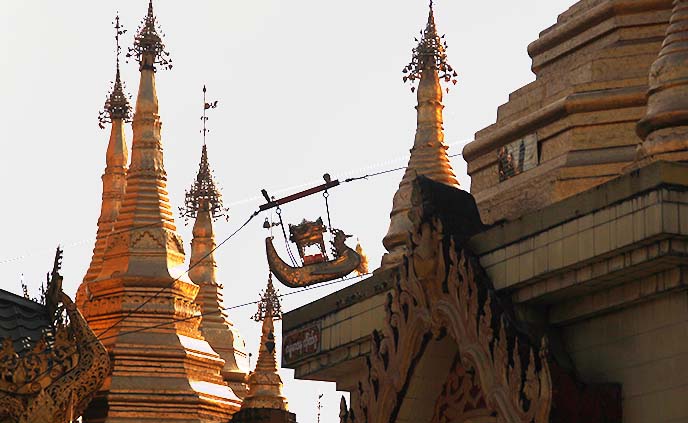
Buddhists can place offerings in a miniature golden ship, which has the mythical karaweik bird at the front. With a system of pulleys, the boat sails up to the stupa.
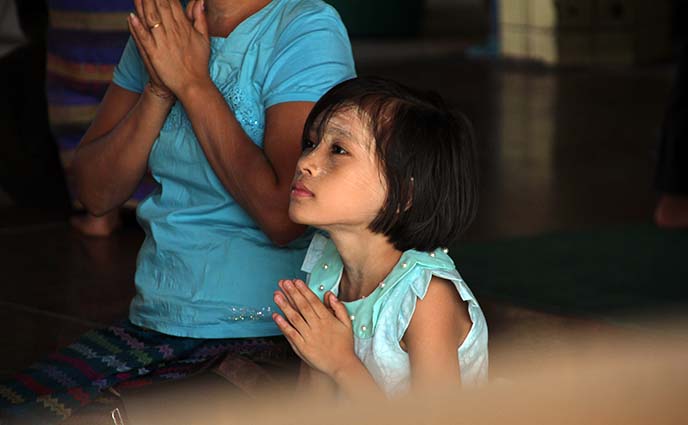
This Burmese child seemed as earnest as her mother in her reflections.
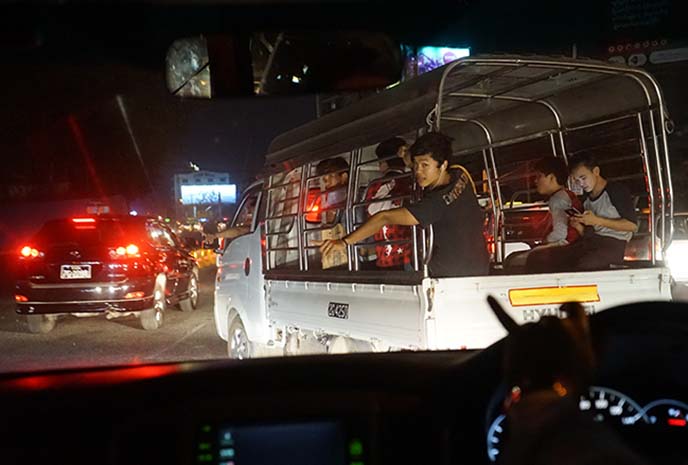
Finally, you can’t leave Yangon without a fine meal. We headed towards Inya Lake, a popular recreational and romantic area. On the way, look out for Aung San Suu Kyi’s compound, where she spent years under house arrest. (We spotted the outside gate, which has a portrait of her father on the top.)
This photo illustrates the fun of driving in Myanmar. You’ll see “boys in the back” of trucks, lounging about. And when the vehicle needs to change lanes, everyone participates in the turn signal!
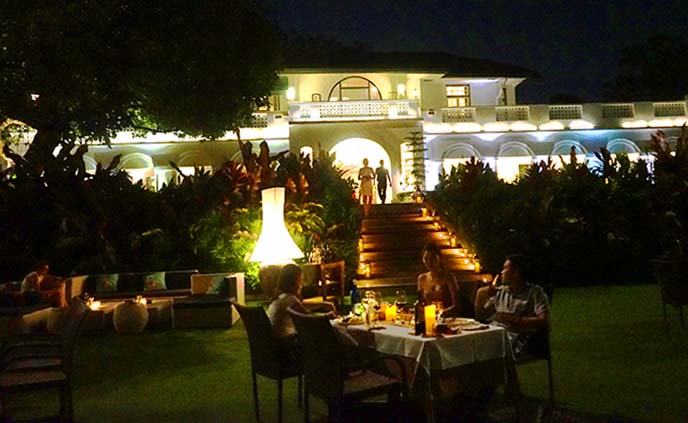
Yukiro and I were having dinner at the highly-rated Le Planteur. As soon as we saw this glorious French colonial manor, lit by lanterns, we knew we were in for a special meal.
Address: 80 University Avenue, Bahan Township, Yangon, Myanmar (Burma)

Le Planteur is all about beautiful service and thoughtful touches — such as this table by the water, covered in fresh rose petals.

We explored the grounds, blooming with lush foliage and secret lounge areas. Many come here for cocktails and light bites.

How beautiful is the waterfront of Inya Lake? In the distance, there’s a rowboat illuminated in lights.
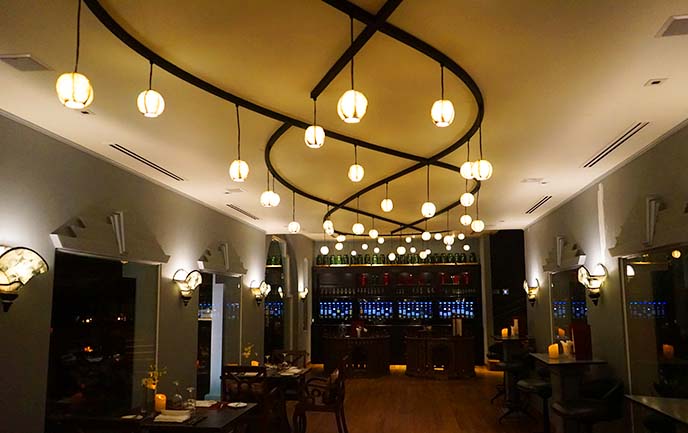
Inside, we were excited to see a high-tech wine dispenser wall! With a touch of a card, you could fill your glass with varietals from around the world.
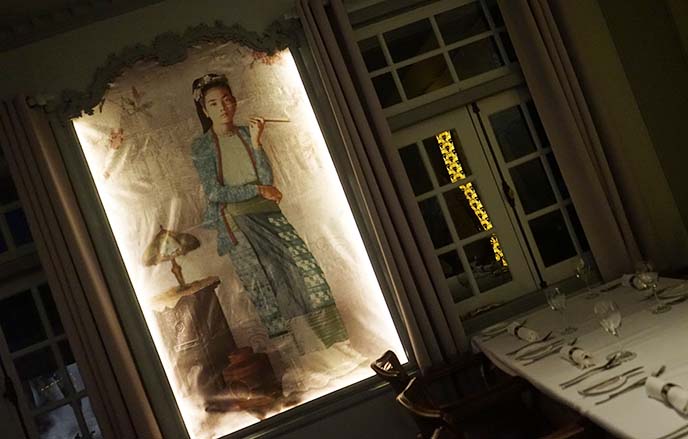
Le Planteur pays tribute to the French colonial days. The manor is filled with glamorous private lounges, perfect for large gatherings.
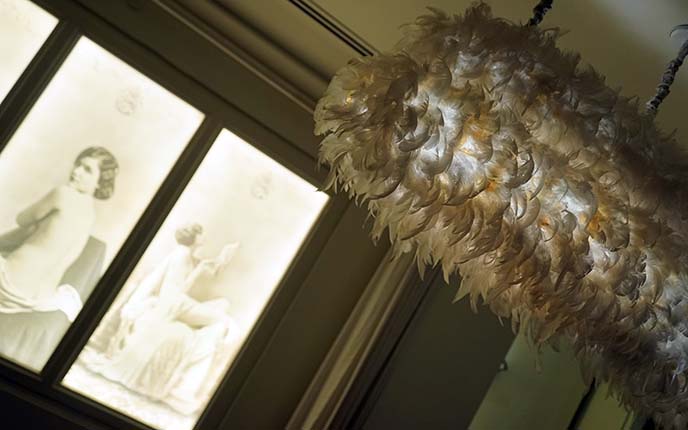
The decor ranges from 19th century style red couches to a chandelier made from white feathers, framed by peek-a-boo vintage photography.
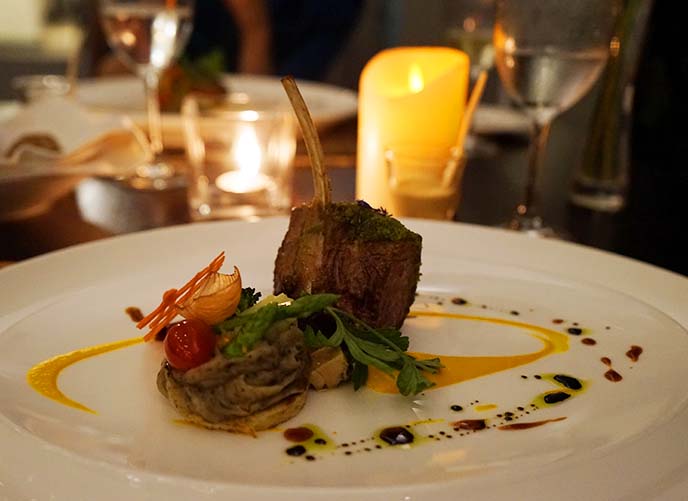
Founder Boris Granges was born in Switzerland, and brought his fine dining expertise to Myanmar. You may order a-la-carte, but I recommend Le Planteur’s degustation menu, which lets you taste the chef’s selection of the day. (It can also be customized if you are vegetarian.)
We started with delightful amuse-bouches of tuna, and ordered a second round of the freshly-baked brown bread rolls.
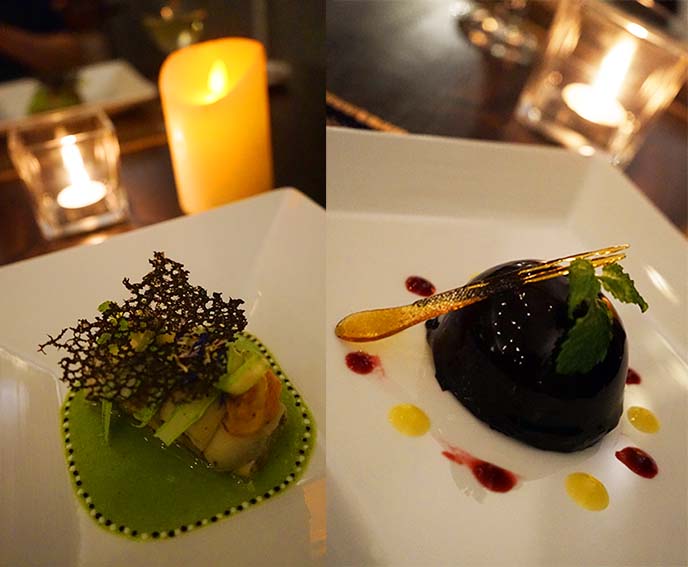
The French cuisine is five stars perfection. Le Planteur uses the freshest ingredients, with a focus on subtle vegetable flavors. Every dish is beautifully executed and presented. On the right, this is my favorite dessert of the year so far: a black chocolate dome with passion fruit heart and tonka bean biscuit.
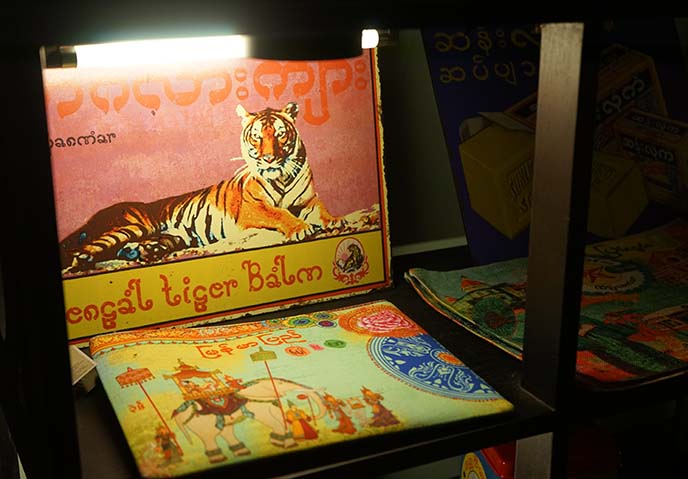
Le Planteur is the place to be for an exquisite meal in Myanmar. (Be sure to browse the artisan shop at the entrance too.)
(For other restaurant suggestions, including homestyle Thai and Burmese food, check out this post.)
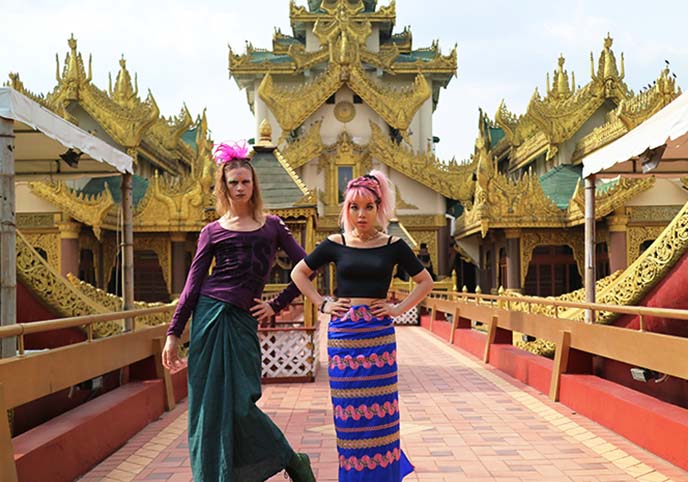
Did you enjoy our Yangon city guide? Here are all my Myanmar posts in one place — we hope to be back soon, to hang out with our new punk and Goth friends. But now, a new journey to South Asia awaits…
We’ll be exploring India and Malaysia! Add @lacarmina Instagram and Snapchat for the first peek.
SHARE & COMMENT

 LA CARMINA
LA CARMINA







23 Comments
O this will be the trip of dreams for me!
yeaaaaaaaaaah 愛してる love love kiss kiss
expecting to see fabulously extravagant photos from India … ^_^
I love your photos! Fantastic!
!!
AWESOME!!!!!
Congrats on the next adventuressss
Thanksssssssssssss
I swear, you and Yukiro are the dream travel duo and you both only get more awesome with each post. Happy travels to you both!!!!! =D
Cheers!
So cool. Have fun!
hehe we will!
Super !
Can’t wait to Discover these new countries with you! Myanmar will be very hard to beat though! Such a fantastique place and invaluable experience <3
We are the world!
La Carmina, that’s was very interesting post on Yangon.
Thanks for reading!
Yass reunion!
!!!
xxx
かわいい!!
^+^
Salute!!!